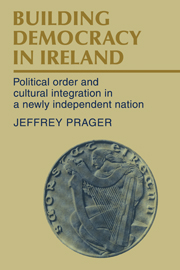 Building Democracy in Ireland
Building Democracy in Ireland Book contents
- Frontmatter
- Contents
- Preface
- Part 1 Democracy in Ireland: Theoretical and Empirical Problems
- Part 2 Patterns of Crisis Resolution in the Irish Free State, 1922–1932
- 4 The Army Mutiny and Normative Political Challenges
- 5 The Boundary Commission Crisis and the Development of Strategies of Political Efficacy
- 6 The Limits of Effective Rule: The Assassination of Kevin O'Higgins and Its Aftermath
- Part 3 The Character of Irish Democracy
- Notes
- References
- Index
5 - The Boundary Commission Crisis and the Development of Strategies of Political Efficacy
Published online by Cambridge University Press: 25 October 2011
- Frontmatter
- Contents
- Preface
- Part 1 Democracy in Ireland: Theoretical and Empirical Problems
- Part 2 Patterns of Crisis Resolution in the Irish Free State, 1922–1932
- 4 The Army Mutiny and Normative Political Challenges
- 5 The Boundary Commission Crisis and the Development of Strategies of Political Efficacy
- 6 The Limits of Effective Rule: The Assassination of Kevin O'Higgins and Its Aftermath
- Part 3 The Character of Irish Democracy
- Notes
- References
- Index
Summary
The army mutiny revealed the fragile and contentious character of democratic norms in a society with deeply rooted value conflicts. But the government's success in quieting the political challenge meant that contending normative claims were no longer the stuff of political opposition movements, even though these issues had hardly been resolved decisively. Contending beliefs concerning the allocation and distribution of resources remained intense; only the government's efficacy in changing the mutiny to a question of political policy prevented that issue from further undermining a weak public sphere. The normative question receded into the background of Free State politics.
As this chapter will illustrate, successful crisis resolution in the Free State would have important consequences for subsequent politics. The government's success in handling one crisis helped shape the character of political expression following it. We can posit a kind of “value-added” political analysis. The Free State, in suppressing the Civil War, weakened the power of value-oriented political conflicts while paving the way for a norm-oriented political challenge, that is, the army mutiny. Similarly, by demonstrating the strength of the political structures in containing the mutiny – the government's ability to subdue normative challenges, to transform principled opposition into issues of policy, and to preserve social order – meant that the subsequent political contests in the Free State shifted downward to organizational battles between political units.
- Type
- Chapter
- Information
- Building Democracy in IrelandPolitical Order and Cultural Integration in a Newly Independent Nation, pp. 131 - 159Publisher: Cambridge University PressPrint publication year: 1986


